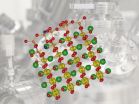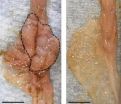(Press-News.org) New York, NY – Prevention and reversal of chronic kidney disease is an urgent public health need. The disease affects 1 in 10 Americans, is debilitating and deadly, and existing drugs, at best, offer only mild delay in progression to end-stage kidney failure. New research led by Icahn School of Medicine at Mount Sinai investigators has uncovered abnormal molecular signaling pathways from disease initiation to irreversible kidney damage, kidney failure, and death. Results from their preclinical and human research are published online March 3 in the Journal of Clinical Investigation.
"Our group is the first to show that endothelial mitochondrial oxidative stress [damage to blood vessel lining that affects the energy-producing part of the cell caused by oxidative stress] regulates the passage of proteins from blood to urine and filtration of waste products in the kidney," said Erwin Bottinger, MD, Director of the Charles Bronfman Institute for Personalized Medicine, and the study's senior author. Specifically, the researchers found albuminuria (protein in the urine) and depletion of the cells that form the kidney's glomerular filtration barrier. "These findings were unexpected and open the door for developing new therapeutic targets," Dr. Bottinger added.
In the preclinical part of the research, investigators used a mouse model to induce scarring in the filtration part of the kidney, or glomeruli. This allowed progressive amounts of protein to pass into the urine and interfered with the clearance of waste products by the kidney. Essentially, the researchers were examining how different signaling mechanism and cellular interactions work, and how when they are disturbed, they promote chronic kidney disease.
Initially, key cells of the glomerular filtration barrier, also called podocytes, cause alterations in endothelin-1, a vasoconstrictor, activating the endothelin receptor A. The activated endothelin receptor A triggered disturbances manifested as endothelial mitochondrial oxidative stress.
The research team was able to confirm that this worked the same way in humans. They studied kidney biopsies, comparing ten biopsies with glomerular sclerosis with six controls. Like in the animal models, the researchers confirmed activated endothelin receptor A and endothelial mitochondrial dysfunction in human glomerular sclerosis biopsies, but not in controls.
"These processes were absolutely essential in causing protein in the urine [or albuminuria], injured podocytes (tiny ball-shaped structures that constrict the blood vessels in the filtering part of the kidney), and cause scarring, all of which can ultimately lead to long-term, irreversible kidney disease. "This is called crosstalk and it is poorly understood," said Ilse S. Daehn, PhD, the study's lead researcher, and Assistant Professor of Medicine in the Division of Nephrology, at the Icahn School of Medicine at Mount Sinai. "We hope that these novel crosstalk findings lead to new therapies that help reverse or arrest chronic kidney disease, which affect millions of Americans," added Dr. Daehn.
Antioxidants that target the mitochondria and endothelin antagonists would alter the paradigm for preventing cell depletion and scarring of the filtration part of the kidney. "There is a pressing unmet medical need to prevent or reverse chronic kidney disease," Dr. Bottinger stressed. "The renin angiotensin inhibitors and angiotensin receptor blockers that are now widely used have not been proven effective in preventing end stage kidney failure. We need more effective drugs to treat the millions of Americans suffering from chronic kidney disease with the goal to eliminate its progression to end- stage kidney failure and with it the need for chronic dialysis and kidney transplantation."
INFORMATION:
Other investigators from the Icahn School of Medicine at Mount Sinai also contributed to this research. In addition, investigators from Columbia University, the University of Heidelberg, and University of Gothenburg contributed to this research.
The work was funded by research grants 5U01DK060995, 5R01DK056077, 5R01DK060043, and 1R01DK097253-01A1 awarded by the National Institute for Diabetes and Digestive and Kidney Diseases to Dr. Bottinger.
About the Mount Sinai Health System
The Mount Sinai Health System is an integrated health system committed to providing distinguished care, conducting transformative research, and advancing biomedical education. Structured around seven member hospital campuses and a single medical school, the Health System has an extensive ambulatory network and a range of inpatient and outpatient services—from community-based facilities to tertiary and quaternary care.
The System includes approximately 6,600 primary and specialty care physicians, 12-minority-owned free-standing ambulatory surgery centers, over 45 ambulatory practices throughout the five boroughs of New York City, Westchester, and Long Island, as well as 31 affiliated community health centers. Physicians are affiliated with the Icahn School of Medicine at Mount Sinai, which is ranked among the top 20 medical schools both in National Institutes of Health funding and by U.S. News & World Report.
For more information, visit http://www.mountsinai.org.
Find Mount Sinai on: Facebook: http://www.facebook.com/mountsinainyc
Twitter @mountsinainyc
YouTube: http://www.youtube.com/mountsinainy
Mount Sinai study points to new biological mechanisms, treatment paradigm for kidney disease
Drug Research and Development should target cell-cell interactions that promote disease progression
2014-03-03
ELSE PRESS RELEASES FROM THIS DATE:
Researchers identify 'carbohydrates in a coal mine' for cancer detection
2014-03-03
Researchers at New York University and the University of Texas at Austin have discovered that carbohydrates serve as identifiers for cancer cells. Their findings, which appear in the journal Proceedings of the National Academy of Sciences, show how these molecules may serve as signals for cancer and explain what's going on inside these cells, pointing to new ways in which sugars function as a looking glass into the workings of their underlying structures.
"Carbohydrates can tell us a lot about what's going on inside of a cell, so they are potentially good markers for ...
New discovery solves problem of anti-inflammatory substance
2014-03-03
There have been great expectations regarding the production of a drug to block the enzyme LTA4 hydrolase, which plays a key role in the body's inflammatory response. However, in clinical trials, such molecules have proven to be only moderately effective. Now, researchers at Karolinska Institutet have successfully refined their understanding of why previous substances have been less effective – and in so doing have produced a molecule that gets around the problem. Consequently, there is once again hope of a new anti-inflammatory drug based on the principal of blocking LTA4 ...
Large mammals were the architects in prehistoric ecosystems
2014-03-03
Researchers from Denmark demonstrate in a study that the large grazers and browsers of the past created a mosaic of varied landscapes consisting of closed and semi-closed forests and parkland. The study will be published on Monday 3 March 2014 in the renowned journal PNAS (Proceedings of the National Academy of Sciences of the United States of America).
Dung beetles recount the nature of the past
The biologists behind the new research findings synthesized decades of studies on fossil beetles, focusing on beetles associated with the dung of large animals in the past ...
Electronics based on a 2-D electron gas
2014-03-03
Usually, microelectronic devices are made of silicon or similar semiconductors. Recently, the electronic properties of metal oxides have become quite interesting. These materials are more complex, yet offer a broader range of possibilities to tune their properties. An important breakthrough has now been achieved at the Vienna University of Technology: a two dimensional electron gas was created in strontium titanate. In a thin layer just below the surface electrons can move freely and occupy different quantum states.
Strontium titanate is not only a potential future alternative ...
Gut microbes spur development of bowel cancer
2014-03-03
It is not only genetics that predispose to bowel cancer; microbes living in the gut help drive the development of intestinal tumors, according to new research in mice published in the March issue of The Journal of Experimental Medicine.
Bowel cancer, also called colorectal cancer, results from a series of genetic changes (mutations) that cause healthy cells to become progressively cancerous, first forming early tumors called polyps that can eventually become malignant. Although mutations can occur anywhere in the human intestine, certain types of colorectal cancer tend ...
In academia, men more likely to cooperate with lower-ranked colleagues
2014-03-03
In academic circles at least, women tend to cooperate with same-sex individuals of higher or lower rank less often than men do. So say researchers who report evidence on March 3 in the Cell Press journal Current Biology. The findings are based on a study of the publication records of professors working at 50 North American universities.
"People are often upset to hear evidence of sex differences in behavior," says Joyce Benenson of Harvard University. "But the more we know, the more easily we can promote a fair society."
The findings might seem somewhat counterintuitive. ...
People with sleep apnea may be at higher risk of pneumonia
2014-03-03
People with sleep apnea appear to be at higher risk of pneumonia than people without, according to a study published in CMAJ (Canadian Medical Association Journal).
Sleep apnea is characterized by disrupted sleep, caused when the upper airway becomes obstructed by soft tissue, cutting off oxygen. It has been linked to several types of heart disease and cognitive impairment. People with obstructive sleep apnea are at higher risk of aspiration while sleeping.
To determine whether sleep apnea is linked to the development of pneumonia, Taiwanese researchers followed 34 ...
Calculating cooperation
2014-03-03
It's long been a popular stereotype: Men are hugely competitive, meaning cooperative effort is the exception rather than the norm, while women have a tendency to nurture relationships with others, making them much more likely to cooperate with one another.
A new Harvard study, however, is turning that cliché on its head.
In fact, within academic departments women of different social or professional "ranks" cooperate with each other less well than men do, according to Joyce Benenson, an Associate of Harvard's Human Evolutionary Biology Department and Professor of Psychology ...
Medicare Part D prescription drug coverage saved $1.5 billion a year in first 4 years
2014-03-03
A new study by the Johns Hopkins Bloomberg School of Public Health and the University of Illinois at Chicago finds that Medicare Part D prescription coverage significantly reduced hospital admissions and program expenditures totaling $1.5 billion annually.
In the largest and most rigorous impact analysis of Medicare Part D to date, researchers found that gaining prescription drug insurance through Medicare Part D reduced hospitalizations by 8%, decreased annual Medicare expenditures for hospitalization by 7% and reduced hospital charges associated with hospitalization ...
Myriad publishes clinical utility study for Prolaris
2014-03-03
SALT LAKE CITY, Utah, March 3, 2014 – Myriad Genetics, Inc. (Nasdaq: MYGN) today announced that it has published data from the PROCEDE 500 study in the journal Current Medical Research and Opinion, demonstrating that 65 percent of physicians changed their original treatment plans for men with prostate cancer based on results from the Prolaris test. Prolaris is a 46-gene molecular diagnostic test that has been evaluated in 11 clinical studies with more than 5,000 patients.
"Prolaris is an absolute game changer for urologists because it adds meaningful new prognostic ...
LAST 30 PRESS RELEASES:
CU Anschutz School of Medicine receives best ranking in NIH funding in 20 years
Mayo Clinic opens patient information office in Cayman Islands
Phonon lasers unlock ultrabroadband acoustic frequency combs
Babies with an increased likelihood of autism may struggle to settle into deep, restorative sleep, according to a new study from the University of East Anglia.
National Reactor Innovation Center opens Molten Salt Thermophysical Examination Capability at INL
International Progressive MS Alliance awards €6.9 million to three studies researching therapies to address common symptoms of progressive MS
Can your soil’s color predict its health?
Biochar nanomaterials could transform medicine, energy, and climate solutions
Turning waste into power: scientists convert discarded phone batteries and industrial lignin into high-performance sodium battery materials
PhD student maps mysterious upper atmosphere of Uranus for the first time
Idaho National Laboratory to accelerate nuclear energy deployment with NVIDIA AI through the Genesis Mission
Blood test could help guide treatment decisions in germ cell tumors
New ‘scimitar-crested’ Spinosaurus species discovered in the central Sahara
“Cyborg” pancreatic organoids can monitor the maturation of islet cells
Technique to extract concepts from AI models can help steer and monitor model outputs
Study clarifies the cancer genome in domestic cats
Crested Spinosaurus fossil was aquatic, but lived 1,000 kilometers from the Tethys Sea
MULTI-evolve: Rapid evolution of complex multi-mutant proteins
A new method to steer AI output uncovers vulnerabilities and potential improvements
Why some objects in space look like snowmen
Flickering glacial climate may have shaped early human evolution
First AHA/ACC acute pulmonary embolism guideline: prompt diagnosis and treatment are key
Could “cyborg” transplants replace pancreatic tissue damaged by diabetes?
Hearing a molecule’s solo performance
Justice after trauma? Race, red tape keep sexual assault victims from compensation
Columbia researchers awarded ARPA-H funding to speed diagnosis of lymphatic disorders
James R. Downing, MD, to step down as president and CEO of St. Jude Children’s Research Hospital in late 2026
A remote-controlled CAR-T for safer immunotherapy
UT College of Veterinary Medicine dean elected Fellow of the American Academy of Microbiology
AERA selects 34 exemplary scholars as 2026 Fellows
[Press-News.org] Mount Sinai study points to new biological mechanisms, treatment paradigm for kidney diseaseDrug Research and Development should target cell-cell interactions that promote disease progression



